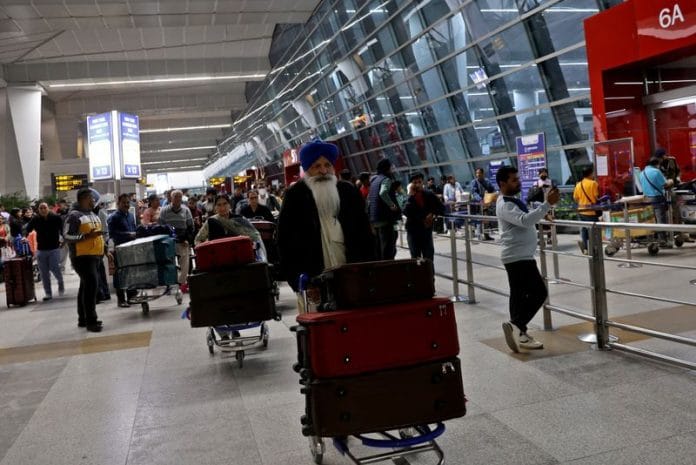BEIJING/NEW DELHI (Reuters) -India and China have agreed to resume direct air services after nearly five years, India’s foreign ministry said on Monday, signalling a thaw in relations between the neighbours after a deadly 2020 military clash on their disputed Himalayan border.
Both sides will negotiate a framework on the flights in a meeting that will be held at an “early date”, the ministry said after a meeting between India’s top diplomat and Chinese Foreign Minister Wang Yi.
China’s foreign ministry confirmed this on Tuesday, adding that another meeting between officials at the vice-ministerial level agreed to facilitate the exchange of journalists between the two countries.
Tensions soured between the two nations after the 2020 clash, following which India made it difficult for Chinese companies to invest in the country, banned hundreds of popular apps and severed passenger routes, although direct cargo flights continued to operate between the countries.
Relations have improved over the past four months with several high-level meetings, including talks between Chinese President Xi Jinping and Indian Prime Minister Narendra Modi in Russia in October.
On Monday, Chinese Foreign Minister Wang Yi told Indian Foreign Secretary Vikram Misri in Beijing that the two countries should work in the same direction, explore more substantive measures and commit to mutual understanding.
“Specific concerns in the economic and trade areas were discussed with a view to resolving these issues and promoting long-term policy transparency and predictability,” the Indian foreign ministry statement said in a statement.
Their meeting was the latest between the two Asian powers following a milestone agreement in October seeking to ease friction along their frontier.
Reuters reported in June that China’s government and airlines had asked India’s civil aviation authorities to re-establish direct air links, but New Delhi resisted as the border dispute continued to weigh on ties.
In October, two Indian government sources told Reuters that India would consider reopening the skies and launch fast-tracking visa approvals.
Both nations have also agreed to resume dialogue for functional exchanges step by step and with an early meeting of the India-China Expert Level Mechanism, India’s foreign ministry said.
China and India should commit to “mutual support and mutual achievement” rather than “suspicion” and “alienation,” Wang said during the two officials’ meeting, according to the Chinese foreign ministry’s readout.
But just as relations began stabilising, China’s approval of the construction of a hydropower dam in Tibet, in the lower reaches of the Yarlung Zangbo river, raised eyebrows in India.
Chinese officials said that hydropower projects in Tibet will not have a major impact on the environment or on downstream water supplies but India and Bangladesh have nevertheless raised concerns about the dam.
The dam, largest of its kind in the world, with an estimated capacity of 300 billion kilowatt-hours of electricity annually, will be located on the river that flows into India as the Brahmaputra, a key water resource for millions.
India has urged China to be transparent and consultative in its plans, underscoring that interests of downstream states not be harmed.
China said during the vice-ministerial meeting on Monday that both sides had agreed to continue cooperation on “cross-border rivers” and work to hold a new round of meetings on this matter at an early date, according to a statement published on the Chinese foreign ministry’s website.
Moreover, China and India agreed to push for the resumption of pilgrimages by Indian pilgrims to Tibet’s sacred mountains and lakes in 2025, the ministry said.
(Reporting by Liz Lee, Ethan Wang, Yukun Zhang, Eduardo Baptista in Beijing, Jessie Pang in Hong Kong and Tanvi Mehta in New Delhi; editing by Christopher Cushing, Sonali Paul and Mark Heinrich)
Disclaimer: This report is auto generated from the Reuters news service. ThePrint holds no responsibility for its content.






